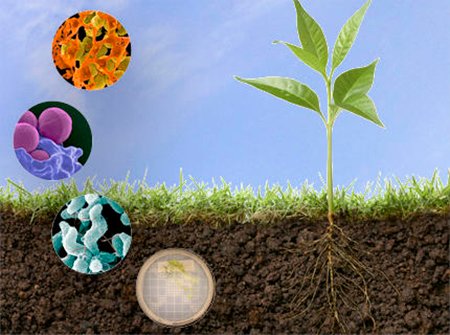The main characteristics of microorganisms are small size,variety,rapid reproduction,and strong adaptability to the environment.Microbes are widely distributed in nature.It can be said that all places where they can survive are their homes.However, the place where microorganisms are most concentrated is soil, which provides various basic elements required for the growth of microorganisms,and also has the advantages of good insulation properties and strong buffering properties.Therefore,soil is the stronghold of microorganisms and is the most abundant bacterial species library.

Soil microorganisms constitute an important factor in soil fertility. Microorganism is a system with small volume and large area, with a huge absorption surface of nutrients, the excretion surface of metabolic waste and the exchange suface of environmental information. It absorbs more, transforms fast. So it provides material basis for the high-speed growth, reproduction and the synthesis of large quantities of metabolites.The natural world is rich in substances and diverse in species, providing rich food for microorganisms.
Microorganisms have diverse nutrient types and metabolic pathways. From inorganic nutrition to organic nutrition, they can make full use of natural resources. The diversity of respiration types allows them to live in aerobic, anoxic, and even anaerobic environments. The diversity of the environment such as extreme high temperatures, high salinity, and extreme pH creates a wide variety of species and a large number of microorganisms.
The soil contains a variety of organic and inorganic nutrients. It is a natural medium for the growth and development of microorganisms. The species of microorganisms in the soil is extremely rich. There are 2.5 billion bacteria, 700,000 actinomycetes, 400,000 fungi, 50,000 algae, 30,000 protozoa.
Microbial fertilizers are products that result in specific fertilizer effects on crops due to microbial life activities. They are selected from the soil and acclimated to microbes that can improve crop nutrition.It includes the fixation of molecular nitrogen in the air, the conversion of nitrogen into autonomous or symbiotic nitrogen-fixing bacteria of plant-usable nitrogen, and the conversion of phosphorus and potassium,which cannot be used by mineral plants,into available phosphorus and potassium,Phosphorus bacteria and potassium bacteria; and secrete a variety of stimulants and antibiotics for the growth of beneficial crops.In short,any microorganism that can directly or indirectly improve the nutritional status of crops can be used as a fungicide or other fillers, used a small amount of chemical fertilizers and some grass ash as carriers, which can be widely used as bacterial fertilizers in agricultural production.Like other fertilizers, microbial fertilizer is used to improve the rhizosphere and foliar nutrition of crops, promote the growth and development of crops, enhance the resistance of crops, and then increase crop yields and improve the quality of agricultural products. Its fertilizer effect is generally considered broad,not only nutrients, but also include the stimulation of crop growth,regulation,assisting crops to absorb water,and reducing or inhibiting the survival of harmful microorganisms due to the extensive growth of inoculated microorganisms in the rhizosphere of crop roots,thus show its effectiveness in mitigating some pests and diseases.
Microbiological research has a wide range of applications in the agricultural sector
Environmental aspects: Microorganisms can repair soil, restore soil vitality, reduce heavy metal pollution, and will not produce secondary pollution. Microbes can also purify water and remove toxic gases from the air.Crop Growth: Microorganisms can promote the absorption of nutrients by crops, promote the growth of crops and increase the immunity of crops. These do not pollute the environment and produce like chemicals and hormones.Organic Fertilizers: Microbial organic fertilizers are a major advancement in organic fertilizers and have many advantages over chemical fertilizers, exquisite organic fertilizers, and farmyard fertilizers.In the field of agriculture, the study of micro-organisms is still in the research stage of monomer micro-organisms.Only the research results at this stage have been well applied in the agricultural field. Therefore, microbial fertilizers have a different mechanism of action than chemical fertilizers and organic fertilizers, and they have unique effects in some respects, so they have received attention from many countries. At least 70 countries are currently researching, producing and applying microbial fertilizers.